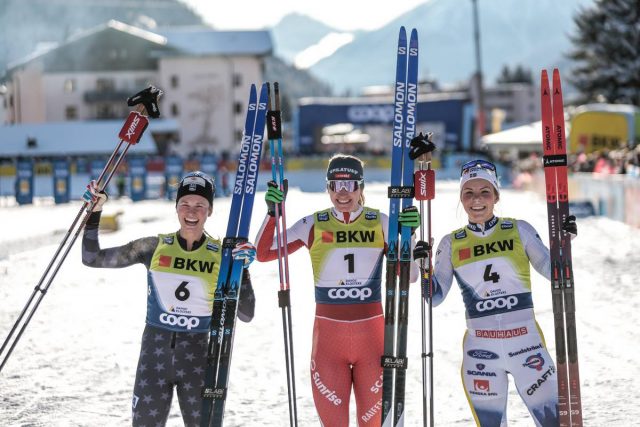 This World Cup coverage is made possible through the generous support of Marty and Kathy Hall and A Hall Mark of Excellence Award. To learn more about A Hall Mark of Excellence Award, or to learn how you can support Fasterskier’s coverage, please contact info@fasterskier.com.
This World Cup coverage is made possible through the generous support of Marty and Kathy Hall and A Hall Mark of Excellence Award. To learn more about A Hall Mark of Excellence Award, or to learn how you can support Fasterskier’s coverage, please contact info@fasterskier.com.
Today marked the return of the World Cup to the alpine valley of Davos, Switzerland. Davos, normally a luxury festooned playground for rock stars, politicians, royalty, and assorted billionaires would have a decidedly more blue-collar feel today as hard working skiers would grind around the freestyle rolling sprint course of 1.5-kilometers. At 5,120 feet above sea level, Davos is about 800 feet below the maximum elevation allowed by the International Ski Federation (FIS). So altitude would have to be accounted for. This morning was the women’s opportunity to test their mettle in the high-altitude luxe setting.
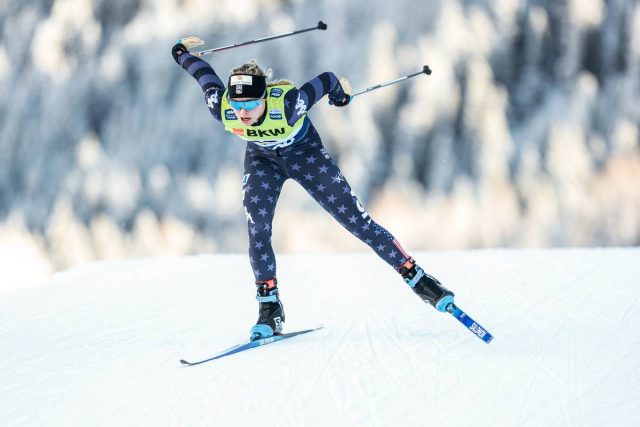
It’s not too early to start looking at the overall World cup standings, and coming into today’s sprints, Tiril Udnes Weng (NOR) was in first with 690 points. Frida Karlsson (SWE) was second with 588 points, and American Jessie Diggins was in third, totaling 538 points. Karlsson would be sidelined this weekend, so it would be a golden opportunity for Diggins to challenge for second place overall.
Health issues would once again be a major theme for today’s sprint. The Swedes dominated the sprints early in the season, but as Period 1 comes to a close, the Swedish squad has been decimated by illness. Swedish standout Maja Dahlqvist—a pre-race favorite and sprint winner at Davos last year—would sit out the weekend due to a cold. The Swedish sprint squad would also be depleted due the continued absence of Emma Ribom, who had won the first two sprints of the year and has now tested positive for Covid. Joining her on the Covid list of Swedish stars would be regular contenders Anna Dyvik and Ebba Andersson. So dire was Team Sweden’s situation that they advanced only two skiers into the qualifying round, one of whom, Jenny Solin, was in only her fifth World Cup race. But the Swedes still had an ace going into the start of the day with Johanna Hagstroem carrying the team’s hopes.
Regarding illness concerns, U.S. coach Chris Grover told Fasterskier that, “It is literally a constant battle now.” He emphasized the logistical challenge with skiers feeling ill or being exposed and needing to isolate from teammates. “We’re basically talking about it at every team meeting.”
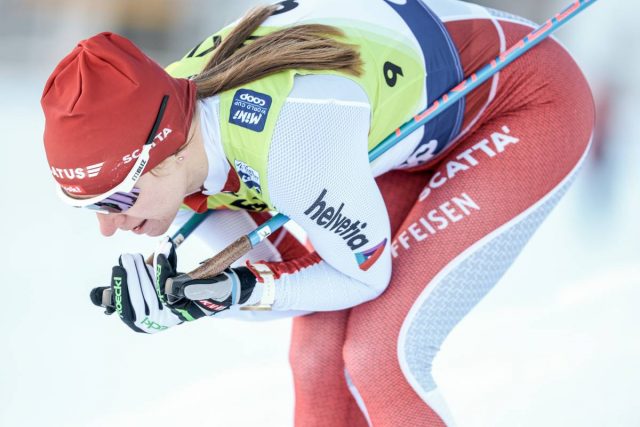
The hometown crowd would pin its hopes on Nadine Faehndrich, the Swiss skier who posted the fastest qualifying time and has been sprinting well of late. Going into the race, she was ranked fourth in sprint points and won the World Cup classic sprint last week in Beitostolen, Norway.
Racers had a beautiful day with bright sun and temperatures in the upper twenties. It was the best that Davos has to offer and a much needed respite from last week’s brutal cold in Beitostolen. Even so, the qualifying field was small, due to a mix of illness and fatigue, consisting of only 39 skiers. With the Americans’ entering five racers, the odds going into the race appeared favorable. Ultimately, four Americans advanced to the quarterfinals: Rosie Brennan qualified fifth, Jessie Diggins sixth, Julia Kern ninth, and Alayna Sonnesyn 25th. Lauren Jortberg narrowly missed qualifying, finishing 34th.
Among Canadians, Dahria Beatty qualified 24th, Olivia Bouffard-Nesbitt 30th , and Liliane Gagnon 32nd. It was the first time in the heats this year for Yukon native Beatty, and the first time ever for Quebec native Bouffard-Nesbitt.
Davos Women’s Sprint
In a tight race it was Faehndrich first, Diggins second, and Hagstroem third. For the Americans who qualified for the heats, Julia Kern finished 10th, Rosie Brennan was 13th, and Alayna Sonnesyn was 24th. For Canadians in the heats, it was Beatty 23rd and Bouffard-Nesbitt 25th.
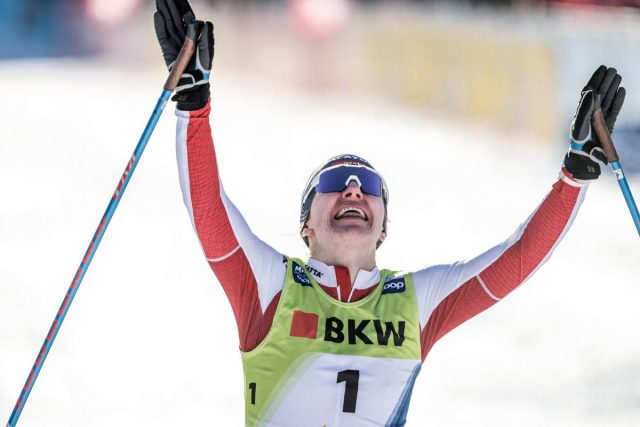
Diggins and Brennan ended up in the same quarterfinal heat. It wasn’t necessarily a premeditated strategy. According to Grover, “When Diggins chose the first heat no one else was in it. When Rosie chose, she went in it next which was a smart strategy.” But this meant that the Americans would have to finish 1-2, or have a fast race for both to qualify. It turned out to be an unlucky turn.
Diggins easily qualified coming in second. Brennan finished third and would have to wait to see if she qualified as a lucky loser. She would not make the cut and finished 13th on the day, no doubt a disappointing outing after her excellent qualifying time. Brennan was squeezed out of advancing by Slovenian sprint specialist Eva Urevc, who performed exceptionally well. Grover commented that it was kind of surprising that Urevc was in the heat as well. “She skied great all day and was surprisingly strong.” In her comments after the race, Brennan said, “I did not have the day I was hoping for today. I am really struggling to find my power and speed in sprinting, which has been frustrating for me.” Addressing any lingering health concerns she continued that, “My fall and early season has been marred by illness, and I think that has made it difficult for me to find all my gears. I am doing my best to find patience as there are still many races left in the season, but patience is not my strength so it’s providing me with quite the challenge . . . I am healthy now, and my base fitness still feels good, so I am looking forward to tomorrow.”

Julia Kern qualified into the second quarterfinal and finished third in her heat as well. She, too, would wait for a lucky loser spot, and ultimately did move forward as a lucky loser.
Alayna Sonnnesyn was in the third quarterfinal. She finished fifth and her racing ended there, but it was a triumphant day for Sonnesyn since it was her first time qualifying into the heats.
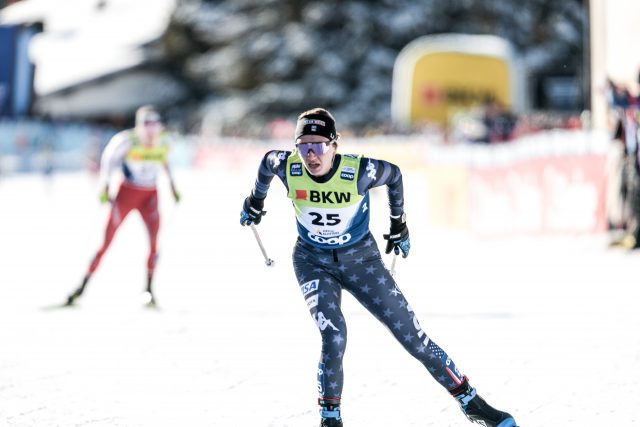
In semifinals Kern found herself skiing in the first semifinal along with her teammate, Diggins. Diggins and Kern started in the back of the pack, but Diggins quickly moved toward the front. Kern stayed in the back and did not seem to have the speed to make a move on the leaders. It was a very tactical race and heading toward the final stretch it was Diggins in third and Kern holding on in fifth. Kern barely missed out on advancing, while Diggins would proceed to the final.
After the race Kern acknowledged her fatigue: “My body felt a bit tired today with the combination of altitude and all of the racing at the end of a long block.” She added, “I was hoping to have a little more pep, but I fought super hard. It was scrappy out there, I was throwing elbows and pushing some arms in the quarterfinals to keep my position. We were all screaming for Jessie in the finals.”
It is a sign of the growth and maturity of the U.S. program that there could be a note of disappointment with “only” one skier in the finals.
The hometown hopes were kept intact when Faehndrich demolished the field in her semifinal, winning by a large margin.
The Finals
In the finals, Diggins slotted into the middle of the pack and then pushed herself into second. At the top of the first hill, T. Weng made an early push to the front while Diggins remained third. Faehndrich powered herself into contention in the middle of the race. Diggins continued to push but could not keep the pace with Faehndrich. It was a four-way fight at the finish with Faehndrich having a slight lead. Ultimately, it was Faehndrich who would come out on top.
Coming into the finish line, it looked like Diggins would have to settle for fourth, but she made a perfect final lunge to finish second. The depleted Swedish team was still able to find its way onto the podium with Hagstroem finishing third.
After the race, Diggins commented that she was channeling the energy from the fans who were extremely enthusiastic. “This course can really take a lot out of you, so I was trying to be smart and conserve where I could,” she said.
“In the finals my strategy was to tuck in behind either Tiril or Nadine, and I just sort of ended up skiing the inside line. I was like, well, I can’t stay behind all these girls . . . that won’t put me into a good place, so I kind of went for the Hail Mary . . . this is either going to work, or I’m probably going to go down . . . it ended up working. I just took a really sharp inside line and it got me my own lane. All that practicing we did down under in Australia really paid off with the lunge.” Jessie Diggins
Said Grover of the finish, Jessie had a fantastic last corner. “From my vantage point, with five meters to go I would have guessed she was going to finish fourth. Jessie spends a lot of time on finish speed and lunging, and it really paid off today.”
T. Weng, who had led for much of the race, ended up on fourth by 1/100th of a second.
Davos Women’s World Cup Sprint RESULTS
